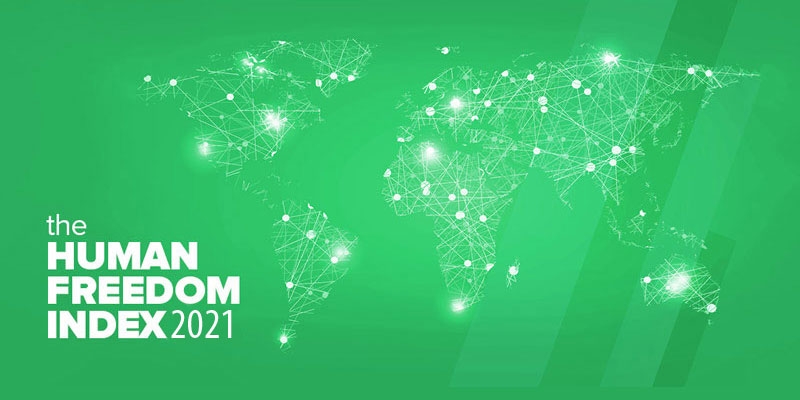The Human Freedom Index 2021

The Human Freedom Index (HFI) presents a broad measure of human freedom, understood as the absence of coercive constraint. This seventh annual index uses 82 distinct indicators of personal and economic freedom in the following areas:
- Rule of law
- Security and safety
- Movement
- Religion
- Association, assembly, and civil society
- Expression and information
- Relationships
- Size of government
- Legal system and property rights
- Sound money
- Freedom to trade internationally
- Regulation
The HFI is the most comprehensive freedom index so far created for a globally meaningful set of countries and jurisdictions representing 98.1 percent of the world's population. The HFI covers 165 jurisdictions for 2019, the most recent year for which sufficient data are available. The index ranks jurisdictions beginning in 2008, the earliest year for which a robust enough index could be produced.
On a scale of 0 to 10, where 10 represents more freedom, the average human freedom rating for 165 jurisdictions in 2019 was 7.12. Among the 162 jurisdictions for which we have data for 2018 and 2019, the overall level of freedom (weighing all jurisdictions equally) remained unchanged, with 82 jurisdictions decreasing their ratings and 67 improving.
Comparing all the jurisdictions for which we have the same data available since 2008, the level of global freedom has decreased slightly (-0.01), with more jurisdictions in the index decreasing their ratings (71) than increasing (67). By the same measure, fully 83 percent of the global population lives in jurisdictions that have seen a fall in human freedom since 2008. That includes decreases in overall freedom in the 10 most populous countries in the world. Only 17 percent of the global population lives in countries that have seen increases in freedom over the same time period.
The data show that there is an unequal distribution of freedom in the world, with only 14.6 percent of the world's population living in the top quartile of jurisdictions in the HFI and 40.3 percent living in the bottom quartile. The gap in human freedom between the most-free and the least-free jurisdictions has widened since 2008, increasing by 6.6 percent when comparing the top and bottom quartile of nations in the HFI.
The countries that took the top 10 places, in order, were Switzerland, New Zealand, Denmark, Estonia, Ireland, Canada and Finland (tied at 6), Australia, Sweden, and Luxembourg. Selected jurisdictions rank as follows: United Kingdom (14), Germany, Japan, and the United States (tied at 15), Taiwan (19), Chile (28), Hong Kong (30), South Korea (31), France (34), Argentina (74), South Africa (77), Brazil (78), Mexico (93), India (119), Nigeria (123), Russia (126), Turkey (139), China (150), Saudi Arabia (155), Iran (160), Venezuela (164), and Syria (165).
Out of 10 regions, the regions with the highest levels of freedom are North America (Canada and the United States), Western Europe, and Oceania. The lowest levels are in the Middle East and North Africa, sub-Saharan Africa, and South Asia. Women-specific freedoms, as measured by five indicators in the index, are strongest in North America, Western Europe, and East Asia and are least protected in the Middle East and North Africa, South Asia, and sub-Saharan Africa.
Jurisdictions in the top quartile of freedom enjoy a significantly higher average per capita income ($48,748) than those in other quartiles; the average per capita income in the least free quartile is $11,259. The HFI also finds a strong relationship between human freedom and democracy.
This year's report is the product of a top-down review resulting in methodological improvements and the use of new variables and sources in addition to, or in replacement of, ones we previously used for what we believe is a more rigorous and robust index. The findings in the HFI suggest that freedom plays an important role in human well-being, and they offer opportunities for further research into the complex ways in which freedom influences, and can be influenced by, political regimes, economic development, and the whole range of indicators of human well-being.




